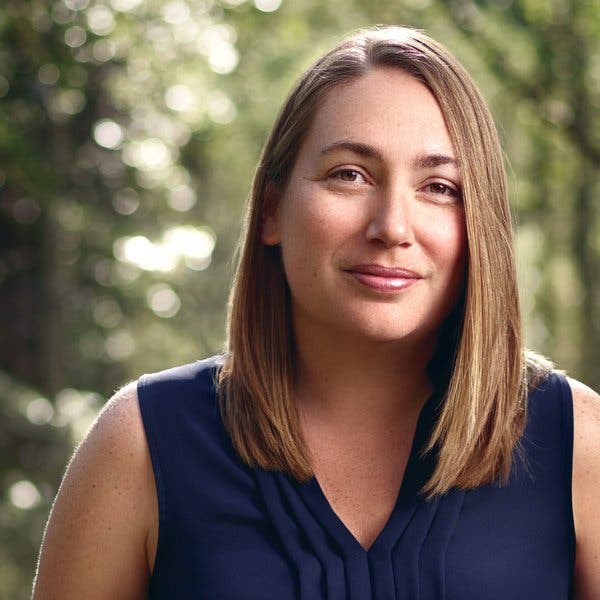Eva Holland grew up “carrying, as most of us do, a quiver of assorted fears,” she writes in her new book, “Nerve: A Personal Journey Through the Science of Fear.” But chief among them was the fear of losing her mother. She felt confident that such a loss could be a “life-destroying force,” since she saw her mother still broken by the death of her own mother when she was a child. In “Nerve,” Holland also writes intimately about her fears of falling, of heights and, after she was involved in traumatic accidents, of driving. And she writes about the science behind those fears and the methods she and others have used to try to overcome them, including a therapy called E.M.D.R., or eye movement desensitization and reprocessing. Below, Holland talks about the scary day when she decided to write the book, the progress she made on her fears and how action movies have taught her some things about writing.
When did you first get the idea to write this book?
I was on a road trip driving home from Arizona in April 2016. It was about seven or eight months at that point since my mom had died, and I’d been thinking about this thread in my life of being really afraid of her dying. And in the months after, I realized that my worst fear had come true, but I was OK. I was sad, but not in the devastating way she had been.
And I was wrestling with my fear of heights, which I’d been dealing with since moving to the Yukon in 2009. I started climbing and pushed myself to do things partly for professional reasons, because these were the stories I had access to that magazines were interested in, so I needed to get out in these mountains and seek terrain. And some of it was personal — this is what my new friends were doing, hiking and climbing and things that involved descents from vertical terrain. To be able to do anything with my friends, I had to get a handle on things. Avoidance would have been easier, but it would have cut me off. I had pushed on these fears, sporadically and unscientifically, over the years.
I wanted to understand what was happening to me, and about fear more broadly, scientifically. While I was driving on the Alaska Highway in northern British Columbia on my way home, I hit a hailstorm in the mountains and rolled my car into a ditch. And that was my second rollover that year. That night in the hospital, I decided: Now you have to do this book on fear. Because I knew I would have some lasting psychological effects from those two crashes.
What’s the most surprising thing you learned while writing it?
How physical everything was. I had known on some level that my experiences had been physical, of course. But I hadn’t thought about that consciously until I understood the science more, and how physical any of our emotions are. Learning that explicitly was really fascinating to me, and made a lot of things click into place. That theme kept recurring through the research in the book, like the physical things I did to treat the traumatic experiences of the car accidents. You hear this stuff about how trauma is held in the body, and it sounds kind of woo-woo, but that was surprising for me.

I was really surprised by how effective the E.M.D.R. treatment was, in particular. It was very visceral, very strange and much more effective than I had imagined. It’s not effective for everyone, no trauma treatment is. I love the quote from the woman who survived the Oklahoma City bombing, who said E.M.D.R. was “the weirdest thing I had ever experienced, with the exception of the bomb.”
In what way is the book you wrote different from the book you set out to write?
Ultimately it was a more optimistic book than I had anticipated. I made more progress on the personal timeline than I expected to, in terms of making headway with my fears. I had anticipated writing a fairly neutral epilogue that said: Well, ultimately I’ve reached the limit of my ability to negotiate my fears, but I’ve still learned some things. But these treatments worked much better than I expected, and in the end I was in a much better place than when I started.
Who is a creative person (not a writer) who has influenced you and your work?
This is a hard one, when you say not a writer, because I feel like I’ve been so single-minded about reading narrative nonfiction to write narrative nonfiction. But when I’m writing some scenes, I do find myself thinking about action movies. I watch a lot of blockbuster movies, and I reach for analogies from them, particularly when I’m writing action scenes. So I’m going to pick Anthony and Joe Russo, who directed the Captain America and Avengers movies.
I think a lot about the training montage, where the hero goes and gets in shape for the challenge ahead, I often use that kind of idea in my head when I’m trying to deliver a lot of information economically
Persuade someone to read “Nerve” in 50 words or less.
We pitched the book as Mary Roach meets Cheryl Strayed. And a friend on Twitter recently said Malcolm Gladwell meets George Plimpton. It’s a personal story about an issue that affects us all. Hopefully I make a useful guide — or a crash test dummy, depending on how you like it.
This interview has been condensed and edited.
 EU News Digest Latest News & Updates
EU News Digest Latest News & Updates



